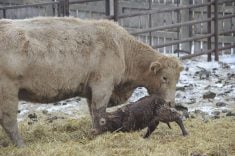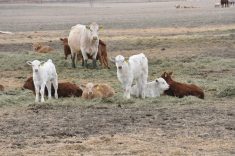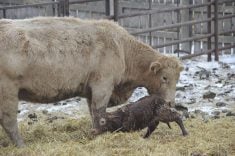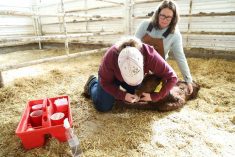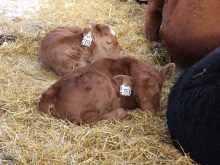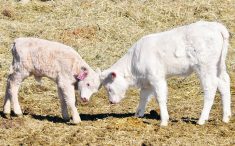A study found that cows did well when they were given higher than the recommended amounts of trace minerals
SAN DIEGO, Calif. — Pregnant women are often advised to take pre-natal vitamins to have a healthy baby.
That advice also applies to beef cattle, said beef extension researchers said at an education session held during the recent National Cattlemen’s Beef Association’s convention held in San Diego.
Cows need zinc, cobalt, manganese and copper during the third trimester of pregnancy.
“We are flushing nutrients into the fetus to make sure they are receiving all they need for development,” said Reinaldo Cooke of Oregon State University.
Read Also

Canada told trade crisis solutions in its hands
Canadians and Canadian exporters need to accept that the old rules of trade are over, and open access to the U.S. market may also be over, says the chief financial correspondent for CTV News.
Supplementing cows during gestation makes them more productive, but they also need to be in good shape with adequate body weight to sustain a pregnancy. Numerous studies have proved this.
“They have to have a good body condition score during gestation to make sure the offspring is healthy when it is born and is a highly productive calf,” he said.
“This only works when you provide good nutrition to your cows. First things first. The body condition score has to be positive and increasing. They should be gaining during gestation. Once you accomplish that, you can think about fine tuning with a trace mineral supplementation strategy.”
These trace minerals are available in organic and inorganic form. Cows are often given copper sulfate, an inorganic form where the metal is attached to a salt.
In one of his studies, cows did well when they were given higher than the recommended amounts as set out by the National Research Council.
“It seems that those cows really used that extra amount of trace minerals and delivered them to the fetus at a greater rate,” he said.
“The bottom line is they could use more trace minerals, specifically cobalt, copper, zinc and manganese.”
His work studied three groups of cattle that were fed either:
- regular forage without supplements
- inorganic minerals
- organic minerals
Weaned calves whose dams had received organic trace minerals generally weighed more and were healthier.
Birth weights were about the same regardless of the mineral type.
The extra cost of the organic minerals worked out to $3.10 per cow, but the calves gained more and were worth an extra $70 per head compared to a control group.
No extra supplements were provided after calving.
The sires were known, so genetic differences could be ruled out.
“Those calves all received the same diets throughout their lives,” he said.
“The only difference was their mommas received mineral supplements during the last three months of gestation.”
The calves were followed to the feedlot and packer, and it was found that supplemented calves at the feedlot seemed to have better immune systems and were sick less often. Those receiving organic minerals also gained 25 pounds more.
Eric Scholljegerdes of the New Mexico State University agreed mineral supplementation for cows is important to improve health, growth and reproduction, but their calves also need to continue receiving supplements.
“Proper nutrition is the best way for those animals to express their genetic potential for growth,” he said.
However, minerals are expensive, and it is hard to know how much the animals are eating. They may not touch it or may overeat. Wildlife may raid supplies if it is left out on the range.
Studies have shown a wide range of variation in nutritional intake. A cow generally receives all the nutrition it needs from forages, but feed should still be tested for deficiencies.
“There is a lot of variation, and you could be in that deficiency state,” he said.
Some regions are deficient in selenium, and some elements in the water, such as sulfate, may tie up minerals such as copper.
Calves are entering feedlots with mineral deficiencies and have health issues exacerbated by the stress of weaning and transportation.
The NRC recommended higher levels of cobalt, copper, manganese, selenium and zinc when calves are undergoing a stressful period such as weaning.
They should receive higher concentrations of minerals when they arrive at the feedlot to compensate for weight loss, which can also affect bone mineral content. The added minerals help build immunity when they are newly exposed to diseases.
The best form of minerals is arguable. Inorganic minerals are cheaper, and loose minerals provide more uniform intake.
Injectable minerals provide a good response when animals arrive at a feedlot, but they do not seem to store as well in the body, so cattle may need additional supplements.
Contact barbara.duckworth@producer.com




